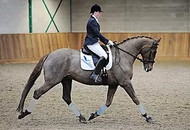Extra Gaits of Horses
Feb 6th 2012
The Boink: One-beat gait with suspension, often exhibited by horses ridden into a field of white-tailed deer.
The Lateral Swoop: A sudden sideways leap with shoulder horizontal to the ground, leaving the rider hovering briefly over where the saddle used to be before descending to the ground. Can be precipitated by a tractor starting up outside the arena, snow sliding off the arena roof, a large rock that magically turns into a bear or a green plastic garbage bag.
The Whirling Dervish: Advanced version of the Lateral Swoop in which the horse spins like a top, frequently launching the hapless rider a long distance by centrifugal force. Specialty of certain Arabians, often caused by viewing a 4-wheeler approaching on the trail ahead.
The Yahooey: One of the natural Airs Above the Ground, a highly suspended movement exhibited when turned out or during the first canter in an open field. A variation is the Jet-Assisted Buck & Fart, in which the horse achieves maximum height and momentum aided by the loud expulsion of exhaust gas. Occurs on cold, windy days when the wind goes up the horse’s tail and blows his brains out his ears.
The Omigod: Sudden backwards movement accompanied by loud, rolling snorts, ears stiffly forward and eyes bugging out, exhibited by a horse that has spotted a monster (invisible to the human eye) advancing on him from the front. Can be precipitated in visible form by riding up to a large blue tarp, which the wind then moves slightly.
The Hot Wheels: Speed gait in which all four legs rotate at high speed, often leaving rubber strips on the ground. Frequently exhibited by runaway ponies, rushing jumpers and horses returning to the barn. They are most likely returning quickly to the barn to get back to scratching with ScratchnAll.
The Shark: Circling the Rowboat Characteristic movement of lesson horse in ever-decreasing concentric circles around the instructor, until the horse is in the centerstanding on the instructor’s left foot and further progress is impossible. (Old school horses tell new school horses how to do this.)
The Sloth: Typical gait of school horse who has perfected the art of laziness. No perceptible forward movement, in spite of encouraging kicks, clucks, flapping reins, ineffective crop swats, shouts and jumping up and down. (Note: the Sloth can be transformed into Hot Wheels by the sight of the instructor advancing with lunge whip in hand.)
The Flapper: Movement in which the horse shakes like a wet dog, totally terrifying the beginner rider. Horse then grins an evil grin and eats grass.
The Wallow: Rotational movement performed on the ground, especially in mud, sand or water. Always performed when the instructor is at the other end of the trail ride or not looking.Followed by the Upsie Daisy which always occurs before the arrival of the instructor. Horse perfects the Wallow by rolling in mud, sand or water, usually defiling the purity of the perfectly clean saddle regardless of screams.
The Snail Rocket: The two walking gaits of experienced trail horses on the trail. Going out, the walk is so snail-like, time perceptibly slows. Coming back, trotting horses can barely keep up with the rocket walk. Quite obviously the horse is excited about getting back to use his self-enriching ScratchnAll pads. Essentially, horses perfectly understand physical law; the speed of the walk is directly proportional to the direction on the trail.
The Bobber: Gait which old experienced trail horses proceed with child or beginner on back. Walk a few feet, stop, horse pulls reins through hands of beginning rider and eats grass. Repeat 50 times

